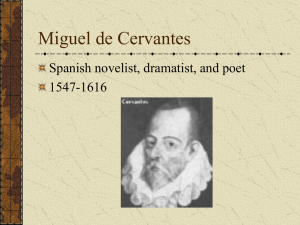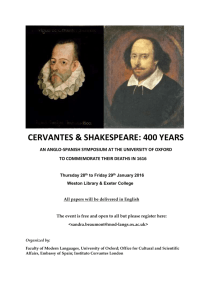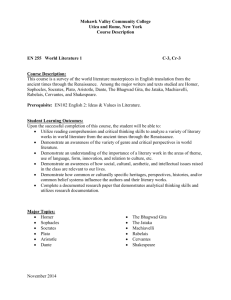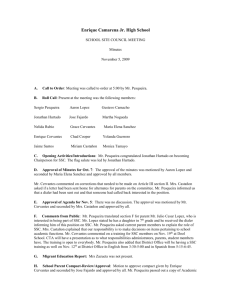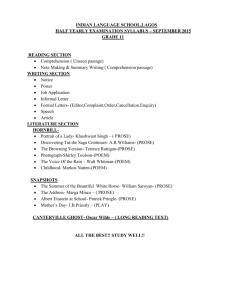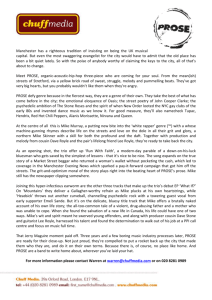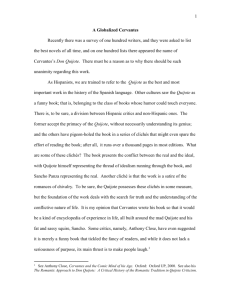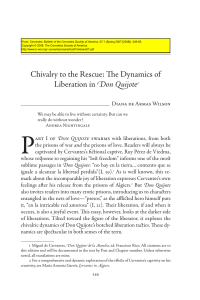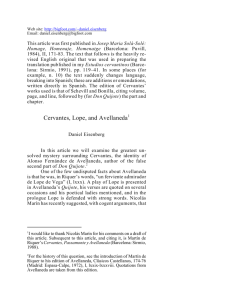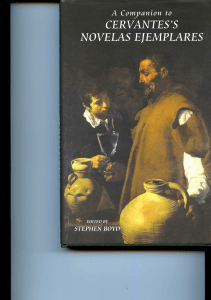SPA_519syl
advertisement
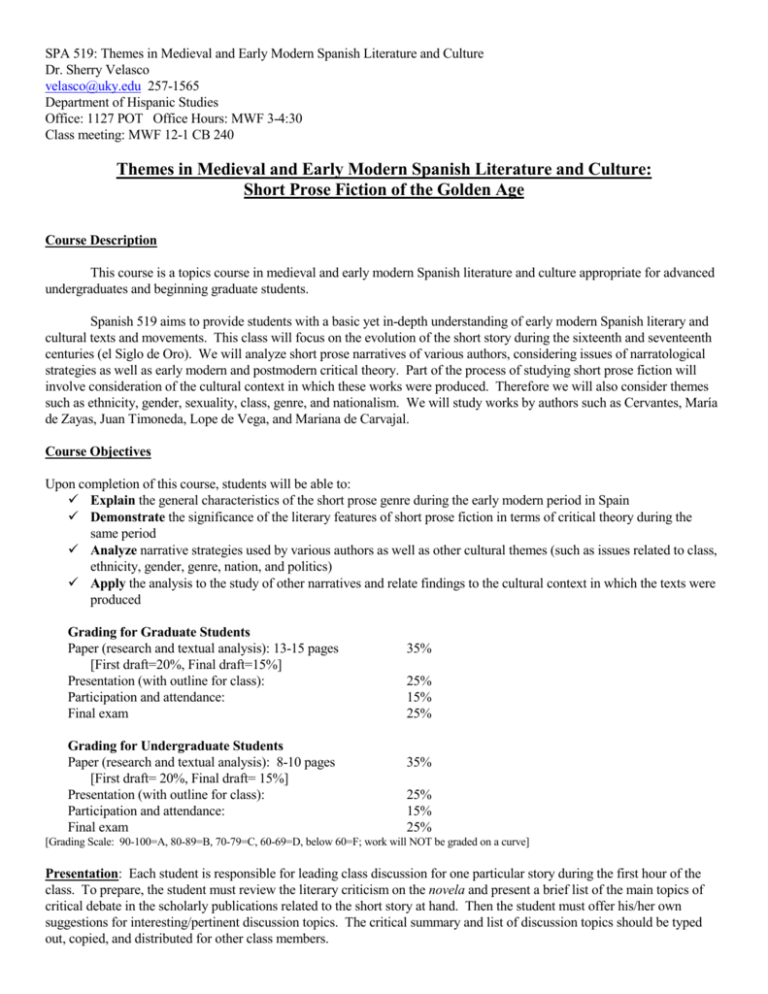
SPA 519: Themes in Medieval and Early Modern Spanish Literature and Culture Dr. Sherry Velasco velasco@uky.edu 257-1565 Department of Hispanic Studies Office: 1127 POT Office Hours: MWF 3-4:30 Class meeting: MWF 12-1 CB 240 Themes in Medieval and Early Modern Spanish Literature and Culture: Short Prose Fiction of the Golden Age Course Description This course is a topics course in medieval and early modern Spanish literature and culture appropriate for advanced undergraduates and beginning graduate students. Spanish 519 aims to provide students with a basic yet in-depth understanding of early modern Spanish literary and cultural texts and movements. This class will focus on the evolution of the short story during the sixteenth and seventeenth centuries (el Siglo de Oro). We will analyze short prose narratives of various authors, considering issues of narratological strategies as well as early modern and postmodern critical theory. Part of the process of studying short prose fiction will involve consideration of the cultural context in which these works were produced. Therefore we will also consider themes such as ethnicity, gender, sexuality, class, genre, and nationalism. We will study works by authors such as Cervantes, María de Zayas, Juan Timoneda, Lope de Vega, and Mariana de Carvajal. Course Objectives Upon completion of this course, students will be able to: Explain the general characteristics of the short prose genre during the early modern period in Spain Demonstrate the significance of the literary features of short prose fiction in terms of critical theory during the same period Analyze narrative strategies used by various authors as well as other cultural themes (such as issues related to class, ethnicity, gender, genre, nation, and politics) Apply the analysis to the study of other narratives and relate findings to the cultural context in which the texts were produced Grading for Graduate Students Paper (research and textual analysis): 13-15 pages [First draft=20%, Final draft=15%] Presentation (with outline for class): Participation and attendance: Final exam Grading for Undergraduate Students Paper (research and textual analysis): 8-10 pages [First draft= 20%, Final draft= 15%] Presentation (with outline for class): Participation and attendance: Final exam 35% 25% 15% 25% 35% 25% 15% 25% [Grading Scale: 90-100=A, 80-89=B, 70-79=C, 60-69=D, below 60=F; work will NOT be graded on a curve] Presentation: Each student is responsible for leading class discussion for one particular story during the first hour of the class. To prepare, the student must review the literary criticism on the novela and present a brief list of the main topics of critical debate in the scholarly publications related to the short story at hand. Then the student must offer his/her own suggestions for interesting/pertinent discussion topics. The critical summary and list of discussion topics should be typed out, copied, and distributed for other class members. Participation: All students must come to every class prepared to discuss the assigned story and must hand in three discussion questions related to the novela. Course Policies: *EVERY STUDENT IS REQUIRED TO TURN IN HOMEWORK (DISCUSSION QUESTIONS) FOR EACH CLASS BEFORE THE START OF CLASS (Hard copy only; no email attachments accepted). NO HOMEWORK WILL BE ACCEPTED ONCE CLASS HAS STARTED. *Attendance is mandatory. For the second and each subsequent unexcused absence, the final average will be lowered by 2 points. Primary Texts Novelas ejemplares I y II, Miguel de Cervantes Novelas amorosas y ejemplares, María de Zayas Desengaños amorosos, María de Zayas Navidades de Madrid, Mariana de Carvajal (copias) “El curioso impertinente” Don Quijote I, Cervantes (copias) “El capitán cautivo” Don Quijote I, Cervantes (copias) Selections from Lope de Vega and Juan de Timoneda (copies) Course outline: Week 1: Introduction to course Prologue to the Novelas ejemplares Critical theory of early modern Spain Week 2: Cervantes: "La gitanilla" Week 3: Cervantes "El amante liberal" Week 4: Cervantes "El licenciado Vidriera" Week 5: Cervantes (Tentative paper Topic due) "Las dos doncellas" Week 6: Cervantes “El coloquio de los perros" (repasen también "El casamiento engañoso”) Week 7: Cervantes “El curioso impertinente” DQI: 33-35 Week 8: Cervantes “El capitán cautivo" en DQI: 37, 39-42 Week 9: María de Zayas “El prevenido engañado” (Novelas amorosas y ejemplares) Week 10: Zayas “La inocencia castigada” (Desengaño quinto de los Desengaños amorosos) Week 11: Zayas "Amar sólo por vencer" (Desengaño sexto de los Desengaños amorosos) Week 12: Zayas “Mal presagio casar lejos” (Desengaño séptimo) (First draft of paper due) Week 13: Zayas “Estragos que causa el vicio” (Desengaño décimo de los Desengaños amorosos) Week 14: Mariana de Carvajal “La Venus de Ferrara” (Navidades de Madrid) Week 15: Selections from Lope de Vega and Juan de Timoneda Final draft of paper due Week 16: Review Upon completion of this course, students will be able to: Explain the general characteristics of the short prose genre during the early modern period in Spain Demonstrate the significance of the literary features of short prose fiction in terms of critical theory during the same period Analyze narrative strategies used by various authors as well as other cultural themes (such as issues related to class, ethnicity, gender, genre, nation, and politics) Apply the analysis to the study of other narratives and relate findings to the cultural context in which the texts were produced

